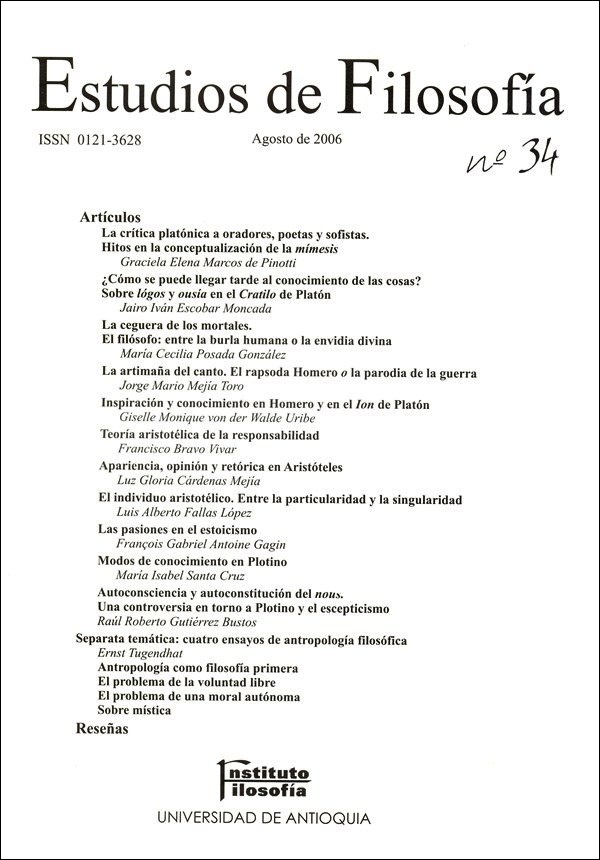The problem of autonomous morality
DOI:
https://doi.org/10.17533/udea.ef.12801Keywords:
motal, jugement, freedom, autonomyAbstract
It can be said, I think, that today we are in a certain disorientation regarding morals, because although almost all of us have quite strong moral convictions, in general we cannot say what they are based on. The reason for this disorientation is that, while before, both in our own culture and in others, morality always had its basis in religion or tradition, such a justification no longer convinces us. Previous Morals were based on an authority that accepted either the authority of God or tradition or both. Consequently, morality had been heteronomous, not autonomous, since it had its foundation in belief and obedience to God or tradition, not in an understanding and a will of its own. The disorientation in which we find ourselves today seems to be rooted in the fact that on the one hand a heteronomous morality no longer convinces us and that, on the other hand, we still do not have a clear understanding of what an autonomous morality is, since contemporary moral conscience is it is made up of a mix of factors from different origins.
Downloads
Downloads
Published
How to Cite
License
Copyright (c) 2006 Ernst Tugendhat

This work is licensed under a Creative Commons Attribution-NonCommercial-ShareAlike 4.0 International License.
Authors who publish with this journal agree to the following terms:
1. The Author retains copyright in the Work, where the term "Work" shall include all digital objects that may result in subsequent electronic publication or distribution.
2. Upon acceptance of the Work, the author shall grant to the Publisher the right of first publication of the Work.
3. The Author shall grant to the Publisher a nonexclusive perpetual right and license to publish, archive, and make accessible the Work in whole or in part in all forms of media now or hereafter known under a Creative Commons Attribution-NoCommercia-ShareAlike (CC BY-NC-SA 4.0), or its equivalent, which, for the avoidance of doubt, allows others to copy, distribute, and transmit the Work under the following conditions: (a) Attribution: Other users must attribute the Work in the manner specified by the author as indicated on the journal Web site;(b) Noncommercial: Other users (including Publisher) may not use this Work for commercial purposes;
4. The Author is able to enter into separate, additional contractual arrangements for the nonexclusive distribution of the journal's published version of the Work (e.g., post it to an institutional repository or publish it in a book), as long as there is provided in the document an acknowledgement of its initial publication in this journal;
5. Authors are permitted, and Estudios de Filosofía promotes, to post online the preprint manuscript of the Work in institutional repositories or on their Websites prior to and during the submission process, as it can lead to productive exchanges, as well as earlier and greater citation of published work (see The Effect of Open Access). Any such posting made before acceptance and publication of the Work is expected be updated upon publication to include a reference to the Estudios de Filosofía's assigned URL to the Article and its final published version in Estudios de Filosofía.















